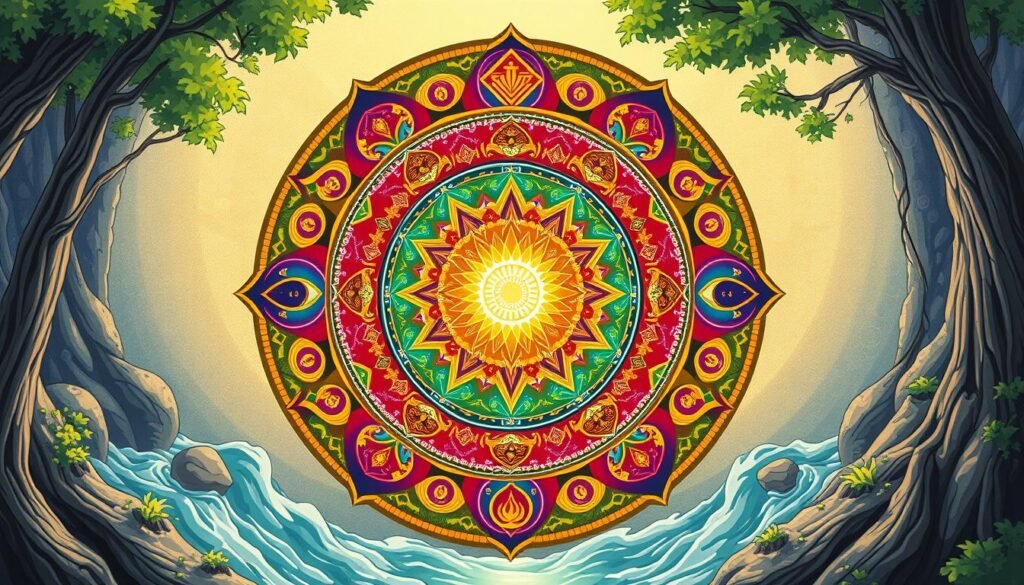What Is the Law of Karma in Hinduism, and How Does It Work?
“As you sow, so shall you reap.” This saying captures the heart of the Law of Karma in Hinduism. It’s a key idea that guides the cosmic justice system in this ancient faith.
The karma philosophy in Hinduism is all about cause and effect. It says our thoughts, words, and actions send out waves in the universe. These waves come back to us, either in this life or the next. This belief is at the core of Hindu ethics and spirituality.
In Hindu thought, the Law of Karma is like a cosmic ledger. It keeps track of our actions, both good and bad, across many lifetimes. This karmic balance sheet shapes our future experiences. It guides us through the cycle of rebirth known as samsara.
The idea of karma first showed up in the Rigveda and grew in the Upanishads. These texts show karma as a force that shapes our world and our thoughts. It offers a complete view of human experience and our role in the universe.
Understanding the Concept of Karma in Hinduism
Karma is a key part of Hindu beliefs. It shapes how Hindus see life, actions, and their effects. The law of cause and effect is at the heart of karma, guiding ethical choices and spiritual growth.
Definition of Karma
Karma comes from the Sanskrit word “karman,” meaning action. In Hindu beliefs, it’s the ethical side of rebirth. Every deed, thought, and word makes karma, affecting one’s present and future lives.
Origins in Hindu Philosophy
The idea of karma started in the Rigveda, an old Hindu text. It became more important in the Upanishads, becoming an ethical guide. Vedic theologian Yajnavalkya said good actions bring good outcomes, while bad actions lead to bad consequences.
Karma as Action and Reaction
In Hindu beliefs, karma works like a natural law. Unlike some religions, it doesn’t rely on divine intervention to reward or punish. Instead, karma creates a cycle of cause and effect. This principle pushes Hindus to live morally and explains why suffering exists.
- Karma determines each soul’s unique destiny
- It influences future births and life situations
- Karma encourages ethical living and personal responsibility
Understanding karma helps Hindus face life’s challenges and grow spiritually. It shows the power of individual choices in shaping one’s path through many lifetimes.
The Three Types of Karma
Hindu philosophy talks about three main types of karma. Each type has its own role in shaping our lives and future.
Kriyaman Karma: Present Actions
Kriyaman karma is about the actions we do now. These choices affect our future and balance. It shows the value of living mindfully and making good choices every day.
Prarabdha Karma: Manifesting Effects
Prarabdha karma is called “ripe” karma. It’s the effects of past actions showing up in our lives now. This type shows that our past actions have consequences we must face.
Sanchita Karma: Accumulated Past Actions
Sanchita karma is all our past actions stored up. It’s like a karmic storehouse for our future experiences. Hindu philosophy says we can change this stored karma through spiritual practices and self-reflection.
Knowing about these types of karma helps us understand the connection between our past, present, and future. It encourages us to live mindfully, make good choices, and grow spiritually.
“Your beliefs become your thoughts. Your thoughts become your words. Your words become your actions. Your actions become your habits. Your habits become your values. Your values become your destiny.” – Mahatma Gandhi
This quote shows how karma works. It tells us that our thoughts and actions shape our lives and future within the karmic cycle.
Law of Karma in Hinduism: Cause and Effect
The law of karma in Hinduism is simple yet deep. It says every action has a result. This idea is key to living right and growing spiritually.
Doing good deeds makes us happy, while bad actions cause pain. Our choices shape our future, teaching us to take responsibility.
In Hindu belief, karma’s effects aren’t immediate. They can show up in this life or later lives. This teaches us to think about our actions’ long-term effects.
It encourages us to live mindfully. We should think about each decision’s possible outcomes.
Hindus talk about three kinds of karma:
- Kriyaman karma: Present actions
- Prarabdha karma: Effects already in motion
- Sanchita karma: Accumulated past actions
Knowing these types helps us on our spiritual path. It shows how past actions and current choices matter. This is key for growing spiritually and breaking free from rebirth.
“As you sow, so shall you reap.”
This old saying captures karma’s heart. It tells us our actions, thoughts, and intentions affect the world. By living ethically and helping others, we can attract good karma. This leads to a better future.
Karma and the Cycle of Reincarnation (Samsara)
In Hindu philosophy, karma and reincarnation are closely linked. They guide the soul’s journey through many lifetimes. This cycle is key to understanding reincarnation beliefs.
Connection Between Karma and Rebirth
Karma, or the law of cause and effect, decides what happens next in a person’s life. It’s at the heart of samsara, the cycle of birth, death, and rebirth. Every action adds to a person’s karmic account, shaping their future lives.
“As a person puts on new garments, giving up old ones, similarly, the soul accepts new material bodies, giving up the old and useless ones.” – Bhagavad Gita
The soul’s path can change based on karma. Hinduism teaches that souls can be reborn in different forms. This shows the value of living ethically and growing spiritually in each life.

Breaking the Cycle of Samsara
The main goal in Hinduism is to escape samsara’s cycle. This freedom, called moksha, comes from spiritual awakening and balancing karma. Meditation, selfless acts, and devotion are ways to achieve this.
- Karma Yoga: The path of selfless action
- Jnana Yoga: The path of knowledge and wisdom
- Bhakti Yoga: The path of devotion and love
By following these paths, people can aim to break the karmic cycle. This leads to moksha, where the soul is free from rebirth and merges with the divine.
The Role of Free Will in Karmic Actions
Free will is key in the law of karma. Karma shapes our lives, but we decide how we react. This shows the value of personal responsibility and making choices that follow our dharma.
The Hindu philosophy says God gave us the freedom to act. This means we’re accountable for our karma. Our actions today influence our future, showing the importance of careful choices.
“We are like passengers on a moving train. We can choose to move forward or stay at the back.” – Ananda Moyi Ma
This analogy shows our power to choose within karma’s bounds. Our past actions set the stage, but our current decisions can change our path. By using our free will wisely, we can build positive karma and move forward spiritually.
Knowing how free will affects karma lets us control our lives. It pushes us to make choices that match our dharma and help us grow spiritually. By embracing this idea, we face life’s challenges with more awareness and purpose.
Karma and Divine Intervention
Hindu theology is a complex mix of divine help and our actions. Karma, a key part of Hindu thought, links with divine watch over. Together, they shape our spiritual paths.
God’s Role in Karmic Consequences
In Hindu belief, God is crucial in how karma works out. People are accountable for their actions, but God decides when and how karma shows up. This balance brings justice to the universe.
Balancing Divine Will and Individual Actions
The mix of God’s plan and our actions is central to Hindu teachings. People see their efforts as a way to build good karma or fix bad karma. This view helps them see a fair world where actions balance out.
Karma is not just a system that works on its own. It’s guided by God’s wisdom and kindness.
Studies show how karma beliefs affect our lives:
- Many people see karma as a way to deal with life’s ups and downs.
- Karma beliefs shape how we interact with others and tackle big issues.
- Our personal stories often back up our beliefs in karma, like passing exams or feeling justice.
Seeing how karma and divine help work together gives Hindus a special view of their place in the universe. It teaches them to live mindfully, knowing God’s grace guides their spiritual journey.
Positive and Negative Karma: Actions and Consequences
In Hinduism, karma shapes our lives through our actions. Good deeds lead to positive outcomes, while harmful acts result in negative consequences. This system of cause and effect influences our spiritual growth and karmic balance.
Positive karma comes from selfless actions, known as nishkam karma. These include acts of kindness, charity, and compassion. By practicing ethical conduct without expecting rewards, we create a virtuous cycle that promotes personal growth and societal harmony.
Negative karma, on the other hand, arises from selfish or harmful deeds, called sakam karma. These actions can hinder spiritual progress and create obstacles in life. The effects of our choices may manifest immediately or in future lives, influencing our circumstances and experiences.
“What you sow, you reap. The fruits of your actions follow you like a shadow.”
To cultivate positive karma and foster spiritual growth, consider these practices:
- Perform acts of kindness without expecting anything in return
- Show gratitude for the blessings in your life
- Meditate to cultivate inner peace and mindfulness
- Support others in need through charitable actions
- Celebrate the successes of those around you
By embracing these principles, we can create a positive karmic balance and pave the way for a more fulfilling life journey.
Karma Yoga: The Path of Selfless Action
Karma Yoga is a key spiritual path in Hindu philosophy. It focuses on selfless service and doing the right thing without caring about the outcome. The Bhagavad Gita, a central Hindu text, says Karma Yoga helps grow spiritually and leads to freedom.
Nishkam Karma: Action Without Expectation
Nishkam Karma is at the heart of Karma Yoga. It means doing actions without hoping for rewards. This idea matches the concept of seva, or serving others without expecting anything in return. Practitioners aim to do their duties fairly, without worrying about success or failure.
Bhagavad Gita’s Teachings on Karma Yoga
The Bhagavad Gita talks about the importance of acting right. It says doing what is right for you, even if it’s not perfect, is better than following someone else’s path. This advice tells people to act in line with their own nature and values.
“Better is one’s own law of works, svadharma, though in itself faulty, than an alien law well wrought out…” – Bhagavad Gita III.35
Karma Yoga encourages trusting that your actions match your inner self. By focusing on meaningful daily actions, not rewards, you can truly live Karma Yoga. This helps you move forward on your spiritual path.
Karma and Dharma: Moral Law and Duty
Hindu ethics blend karma and dharma, laying the groundwork for moral responsibility and spiritual discipline. Dharma guides us to live righteously, while karma shows the results of our actions.
Dharma includes duties like honesty, nonviolence, and following spiritual rules. It shows us what actions are right and moral. There are many types of dharmas, each covering different moral duties:
- Duties towards parents
- Obligations to teachers
- Responsibilities to ancestors
- Devotion to deities
- Occupational duties
The concept of karma is about cause and effect. Every action creates energy that comes back to us. Hindu teachings talk about three main types of karma:
- Prarabdha karma: Current life experiences
- Sanchita karma: Accumulated past actions
- Agami karma: Future consequences
Living in harmony with dharma brings joy, peace, strength, and protection. This balance creates positive karma, helping us grow and keep the world in order. By following dharma, we can break free from karma’s cycle and reach spiritual enlightenment.
“Dharma protects those who protect it.”
Karma and dharma shape our destinies, showing the impact of our actions. By embracing Hindu ethics, we practice moral responsibility and spiritual discipline. This helps us build a harmonious society and advance on our spiritual path.
Overcoming Negative Karma: Spiritual Practices and Rituals
Hinduism has many spiritual rituals and practices to help people overcome negative karma. These methods aim to remove karmic burdens and help individuals grow. Let’s look at some key ways Hindus balance their karmic accounts.
Meditation and Self-Reflection
Meditation is key in Hindu practices for karmic cleansing. It helps quiet the mind and gain insight into actions and motivations. This self-reflection lets people see patterns that lead to negative karma, helping them change their behavior.
Acts of Service and Charity
Doing selfless service, known as seva, is a strong way to create positive karma. Helping others without expecting anything in return can balance out past negative actions. Even small charitable acts help with spiritual growth and karmic balance.
Devotional Practices (Bhakti)
Bhakti yoga, or the path of devotion, is a favorite in Hinduism for spiritual growth. Through prayer, chanting, and worship, devotees connect deeply with the Divine. This devotion purifies the mind and heart, reducing negative karma’s impact.
Source Links
- Karma in Hinduism
- Karma and Dharma
- Karma | Indian Philosophy & Its Impact on Life | Britannica
- BBC – Religions – Hinduism: Hindu concepts
- Karma – Heart Of Hinduism
- 4 Types of Karma You Can’t Avoid – os.me
- Karma
- Hinduism And Hinduism: The Law Of Cause And Effect
- What Is Karma?
- Hinduism – Karma, Samsara, Moksha | Britannica
- The Hindu Theology of Samsara and Yoga
- The cycle of samsara, karma, and reincarnation | Intro to Hinduism Class Notes | Fiveable
- Karma and Free Will — Ananda
- KARMA, FATE AND FREE WILL
- Karma
- How karma screwed me over
- Understanding the Concept of Karma and Rebirth in Hinduism – Hinduism – Sanatana Dharma
- Karma yoga
- Why Karma Yoga Goes Beyond "Selfless Service"
- Karma and Dharma
- Dharma and Karma: What They Mean – Fabric of Folklore
- Karma in Hinduism
- Karma Management – Hinduism Today








